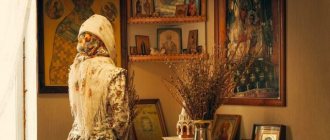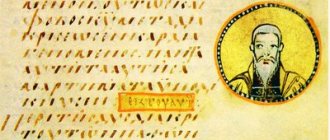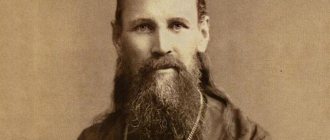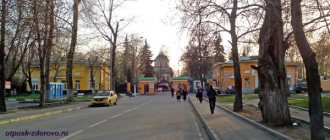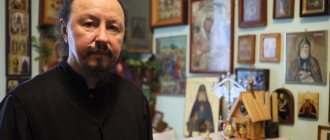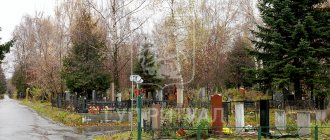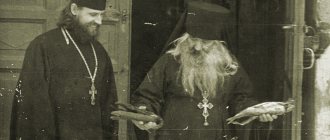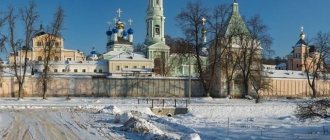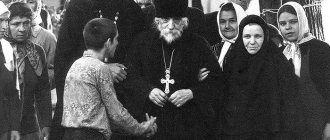In Russia, the 20th century turned out to be extremely bloody - 2 World Wars, one terrible revolution and endless terror of Orthodoxy. Many men of faith were killed for their faith or sent into exile to the north. However, those who went through all the trials and did not abandon faith in Christ received His blessing and became real pillars of the Orthodox Church. One of these pillars was Archimandrite John Krestyankin, who saw all the torment and blood of the 20th century and until his last days retained an ardent and persistent faith in the Lord God.
Life in the Church
In Moscow, Archpriest Alexander Voskresensky became the spiritual mentor of the future archimandrite, and his social circle included Alexander Moskvitin, Vasily Serebryanikov, Konstantin Nechaev and Vladimir Rodin, who would later occupy important places in the life of the Russian Orthodox Church.
At that time, the Church was going through difficult times - it was necessary to compromise with the authorities, register churches or go under arrest. Archpriest Voskresensky managed to instruct young people, convinced them not to condemn ministers collaborating with communists and to give future priests the right direction.
Book of Archimandrite John Krestyankin
Ivan spent the war in Moscow, where he miraculously received registration. The young man was not drafted into the army or the front due to severe myopia, and he left work in 1944, completely devoting himself to serving in the church. After the death of Voskresensky, Abbot Sokolov became Krestyankin’s mentor and helped him understand his future path.
Letters of the Archimandrite
Having grown old, Archimandrite John Krestyankin could no longer receive so many people, but he constantly answered their letters. Later some of them were published. These books immediately became popular among believers. One of the most famous publications was published in 2002.
“Letters of John Krestyankin” is a collection of the elder’s answers to several Orthodox Christians, whom he could no longer accept personally. They were published by the publishing house of the Pskov-Pechersk Monastery. They talk about everything that can be encountered in this world. About God, the world, man, the church, the need to follow the commandments.
John Krestyankin's sermons contain useful advice. In his speeches, the archimandrite discusses how to choose the right path in life. There are also instructions for parishioners.
The pursuit
A prominent priest who fervently served the Lord and refused to compromise with the authorities was under the surveillance of the NKVD for a long time. And in 1950 he was arrested, spending 4 months under investigation in Lubyanka and Lefortovo. Like all Christians, they tried to force priest John to cooperate with numerous denunciations, slander and false accusations.
However, the future elder meekly but firmly stood his ground, lovingly treating his tormentors. However, on October 8, a trial took place over him, which sentenced the deacon to 7 years of imprisonment in a maximum security camp under Article 58-10 of the Criminal Code of the USSR. After the trial, the priest was sent to the Arkhangelsk region, to the Chernaya Rechka crossing, where logging was going on.
Interesting! Cellmates remembered the priest as prompt, neat and loving. Everyone, cellmates and other prisoners, came to him for help and prayer. Despite the torment in the camp, Ivan’s eyes, as cellmate Vladimir Sabo recalls, always radiated warmth and love, remaining sparkling.
Despite the respect of the prisoners, the priest was forced to work hard at the logging site, where his health suffered greatly. In the spring of 1953, he was transferred to a disabled unit, where he worked as an accountant. In the winter of 1955, he was paroled for good behavior.
Ministry in dioceses
Despite his early release, Ioann Krestyankin was not allowed to return to Moscow. He went to the Pskov diocese and began to serve in the Trinity Local Cathedral. In the 1950s, the church especially suffered from oppression, so control over all clergy was incredibly tight.
Due to his active work, the priest quickly came to the attention of the services and was forced to leave Pskov immediately in 1957, fearing re-imprisonment. John continued his ministry in a rural parish in the Ryazan region.
Father John Krestyankin in the monastery
In the Trinity Church in the village of Trinity-Pelenitsa, and then in the village of Letovo, he served as the second priest and sought to help people who needed not only food, but also spiritual food amid the rampant atheism. In June 1962, John was transferred to serve in the village of Borets, and then to Nekrasovka, where he served for about 4 years.
The rapid change of places of activity was due to the fact that the authorities did not want to see an active priest in their district. After all, John Krestyankin not only preached beautifully and forced people to turn from atheism to the Lord, he, thanks to his education as an accountant, quickly put church affairs in order and began to engage in economic improvement and restoration of churches.
The last parish was in the city of Kasimov, where he served in the St. Nicholas Church for only 2 months - fearing persecution and fulfilling his childhood dream, he took monastic vows under the leadership and with the blessing of the Glinsky elder Seraphim.
Childhood
John Krestyankin was born on April 11, 1910, back in the Russian Empire, in the city of Orel. His parents, Mikhail Dmitrievich and Elisaveta Ilarionovna, were bourgeois. There were 8 children in their family, Ivan was the youngest.
As a small boy, he began to serve under the local Archbishop Seraphim (in the world Mikhail Mitrofanovich Ostroumov).
Already 6-year-old John Krestyankin was Seraphim’s sexton, and a little later a subdeacon - a junior church employee. At the age of 12, he first expressed his intention to become a monk in the future. Krestyankin himself talks about this episode as follows.
Bishop Nicholas from the Vladimir diocese arrived to visit the pilgrims. When he was already saying goodbye, John, like the others, wished to receive parting words for life. And he lightly touched his hand to draw attention to himself. The Bishop noticed him and asked what he wanted. Young Ivan replied that he would like to become a monk. The priest put his hand on his head and seemed to be deep in thought. Only then did he admonish me, recommending that I finish school, get a job, and only then be ordained and begin serving. So he will come to monasticism.
Later, this episode from the life of the elder was confirmed by Bishop Seraphim.
Monastic life
After being tonsured, Abbot John went to the Pskov-Pechersky Monastery, where he lived from 1967 to 2006. Three years after his tonsure he became abbot, and in 1973 he took the post of archimandrite of the monastery. Under the leadership of the abbot there were 60 monks, half of whom were already aged, and the other half had gone through difficult trials and persecution of the Soviet regime.
However, John stood out among them for his wisdom and love; people from other regions constantly came to him for prayer, blessing and advice. Once, in 2000, the President of the Russian Federation Vladimir Putin visited the elder’s cell. It is not known for certain what they talked about.
Important! Contemporaries claimed that immediately after the liturgy in the church, Archimandrite John began receiving parishioners: some came to ask for blessings, others came to resolve clergy issues, pilgrims were thirsty for prayer, and local monks wanted to discuss issues of the monastery.
Father was always surrounded by a crowd of people; he was a spiritual mentor for many. Before and after lunch, the archimandrite dealt with questions from the parishioners and only late in the evening could he rest and work: answer numerous letters and work on his own articles and books.
Company vs. Taxpayer Identification Number and end of life
In 2001, Russia adopted a law on TIN - taxpayer identification number, i.e. a combination of numbers by which a citizen is recorded in the tax base. A small conflict emerged in the Orthodox community, since half of the believers believed that accepting the TIN meant accepting the number of the Antichrist, while the other had nothing against the law.
Archimandrite John spoke out against the campaign to refuse to accept the TIN, arguing that this is just panic, because no one can lose their Christian name, even after accepting the number. John Krestyankin convinced people that the bureaucratic procedures of the state do not yet take away faith or salvation, and the fact that the name is replaced by numbers is not scary - God remembers everyone by name.
Father John Krestyankin at the service
With this, he calmed the panic and stopped the campaign against abandoning the TIN. The archimandrite served his last Easter Matins in the spring of 2001, after which he fell ill and was seriously ill until the end of his days, almost never getting out of bed. Despite his poor health, he received a small number of visitors weekly.
In 2005, on the occasion of his anniversary (he turned 95 years old), he was awarded the church order of St. Seraphim of Sarov, 1st degree. Two months before his death, the monk began to receive communion daily, not knowing the exact time of his death, but preparing for it. On February 5, 2006, after several years of illness, Archimandrite John died at the age of 96 and was buried in the caves of the Assumption Pskov-Pechersky Monastery.
The creative activity of Father John Krestyankin as a writer
Among the literary monuments of the pastor’s spiritual heritage, a significant part belongs to published letters (see: Letters). As a rule, they are all full of love and care. In them he gives moral instructions and advice, sometimes denounces, and promises to pray.
In addition, many of the soul-helping instructions of Father John are known to us from such works as “The Experience of Constructing a Confession”, “Handbook for Monastics and Laity”, “Sermons”.
During the spread of unrest and panic among believers regarding the assignment of TINs to Russian citizens, the priest expressed a firm judgment that, first of all, a Christian is distinguished not by the presence or absence of an individual number assigned by the state, but by faith and virtue.
“You can’t think like that”
Nina Ermolaeva:
— This was in the early 1990s. One of my sisters caught her husband with his mistress. They had a 2-story apartment on the 12th-13th floors. A scandal broke out between them, and the mistress tried to climb over the balcony of one floor to another. No one saw it happen, but it crashed. After this tragedy, the sister went to Pechory to visit Father John with another sister. Father accepted them. With one of the sisters, he moved a little away from the other, but she involuntarily heard their entire conversation. And when the other sister approached the moment of the tragedy itself, the priest said: “If only it wasn’t suicide, if only it wasn’t suicide!”
The sister who heard this conversation involuntarily flashed through her head the thought: “A dog’s death is a dog’s death.” At the same moment, Father suddenly quickly turned in her direction and said: “But you can’t think like that.”
Beast
Tatyana Sergeevna Smirnova, Father John’s long-term clerk:
— Early in the morning of May 6 (it was Tuesday of Easter week and the feast of the Great Martyr George the Victorious), when after winter the cows were put out to pasture for the first time, I came to Father John. He responded to my joyful Easter greeting somehow with a patter and asked with alarm: “What happened in the monastery? How is Father Viceroy?” Making my way to the cell, I didn’t notice any disturbances and the last thing I wanted was to meet the Viceroy, so I answered complacently that the sun rejoices at Easter, and so do we all. To repeat “Christ is Risen!” Father John answered more cheerfully. But instead of talking about business, he sat down on the sofa and began to talk about the vision that visited him a few minutes before my appearance.
The entire monastery immediately appeared to him in heavenly radiance and joy, the Assumption Cathedral was burning in gold. Against this solemn background, Father Viceroy Archimandrite Gabriel walked decorously towards the economic gates, in full regalia. A moment later, a black ball appeared behind him, taking the shape of a formidable beast of an unknown breed, and quickly flew after him. A few leaps and the beast will crush the Viceroy. Father John rushed to the icons, and at that moment a knock on the door interrupted the vision. To make sure that nothing terrible really happened in the monastery, Father John himself went to find out if everything was in order. He returned soon, but the anxiety did not leave him: having crossed himself several times, he hastily sent me out.
When I brought the letters in the evening, the priest again remembered the morning vision with gratitude to God that it was just demonic insurance, and Easter week was not overshadowed by anything. There was no further mention or conversation about this.
Several years passed, and one day I unexpectedly heard this story from Hieromonk Joasaph (Shvetsov). I don’t remember on what occasion a conversation arose between us about Father Vicar, who had not been in the monastery for a long time. In 1988, he became a bishop and served in the Far East, but we remembered him well and quite often, because we went through serious schooling under his leadership. For some reason, Father Joasaph began to tell the story of days gone by, connected with the Viceroy, and voiced what I had heard... from Father John. I jumped up: “How do you know about this vision of the priest?” - “What other vision? “I saw it all with my own eyes,” he replied.
I will give his story. The hieromonk was then still novice Alexander and from early morning he was on duty at the service gate booth. It was a holiday, the herd was being driven out to pasture. They served a prayer service. The cows solemnly followed the shepherd, but there was a hitch with the bull, they fiddled for a long time, freeing him from the leash, and he not only became worried, but became furious. When he felt freedom, he flew out of the barn like a whirlwind, so that at the turn his backside skidded. All those present instantly fled away from harm and only one Viceroy, not suspecting anything, complacently walked towards the gate. In horror, Alexander covered his face with his hands, expecting that he would inevitably be splashed with blood. He heard the tramp of an animal rushing past and opened his face. The governor, leaning against the wall, looked in bewilderment after the rushing bull. At the last moment, some force literally threw him like a feather against the wall, and he remained alive. Did he later find out to whom he owed his salvation?
Ivan attended church throughout his childhood, and when work in Orel interfered with this, he had to break up with her
At the age of six, Ivan became a sexton in a local church. Then - subdeacon. He did not just blindly fulfill his duties, but actually developed spiritually and sought new knowledge.
He communicated with archpriests, who can be called his spiritual mentors. But the greatest influence was made by Archbishop Seraphim Ostroumov.
Six years passed, during which the desire to serve God did not disappear, but only strengthened. Vanya decided to become a monk. The priests approved of this, but it was too early for ordination.
The young man went to school and graduated in 1929. Then he chose to work as an accountant and took special courses. I found a position that suits my education.
Ivan Krestyankin told management that his work prevented him from visiting the temple.
There was so much to do that Ivan Mikhailovich simply did not have time to get to the temple. Life went at a completely different pace and in a completely different direction than he had expected.
This was annoying. The accountant expressed his irritation to management, for which he quickly lost his position.
"Mitred"
Anastasia Goryunova:
“Once, in Father’s cell, a young girl from some Russian city, Voronezh, it seems, ended up with me in my cell. I remember well that Father called her Olenka. From the conversation it became clear that she fell in love with a believing young man, a seminary student. And her dad, a major party boss, is categorically against their marriage. Olya cried bitterly. And for some reason Father smiled joyfully:
- Olenka, God bless him, he will finish his studies, and after that you will get married. In the meantime, take care of purity: the wife of the future priest, and he himself, must be as pure as doves when entering into marriage. – Father paused, concentrating on prayer, and added even more cheerfully. - You will, you will be mitered.
He affectionately patted and stroked Olya on the crown. Many years later I saw Mother Olga, who came to Pechory with her husband, already a mitred archpriest. And then the girl Olga, continuing to cry bitterly, objected:
- Why, Father, dad will kill me! He will never agree.
“He will agree,” answered Father firmly, “and he will also pray at your wedding.” Ride with God and don't be afraid of anything.
I don’t know whether Father’s prediction about Olya’s father came true, but I think it did, as did the prediction about the miter for her future husband.
One day Father gave me the book “Gospel Conversations,” where ordinary Gospel readings for the entire year are interpreted. And I, confusing it with the book of St. Theophan, say: “I have it, I read it every day.” Father at first wanted to leave the book to someone else, but he thought about it and exclaimed: “You don’t have the same one!” For you it begins with the New Year, and this year begins with the day of Holy Easter until Holy Saturday.” I didn’t even notice that my book begins with the New Year - the Circumcision of the Lord, but when I arrived home, I was able to verify this. So Father, out of insight, saw my book, and it turned out to be completely different from what I received as a gift from Father.
